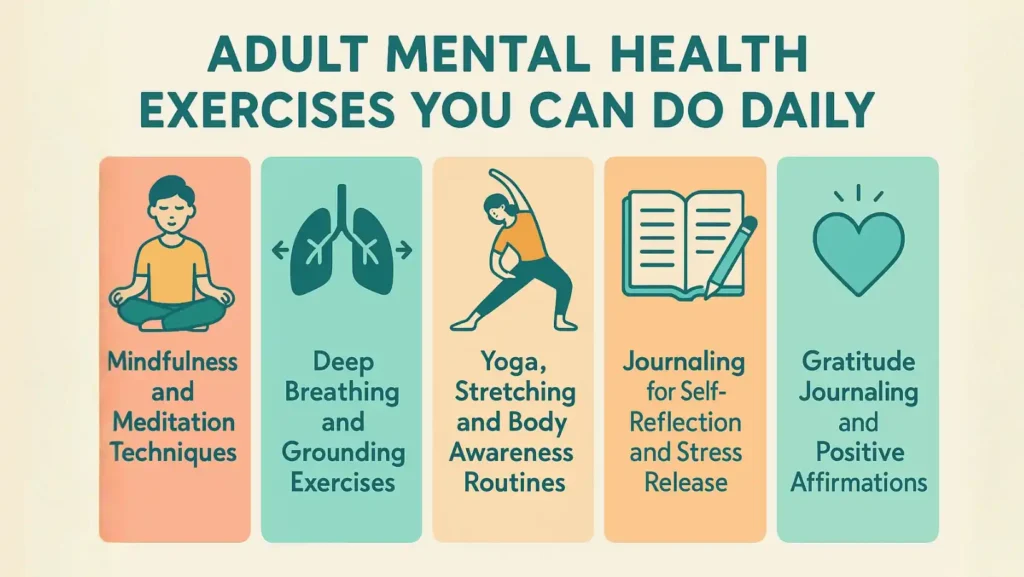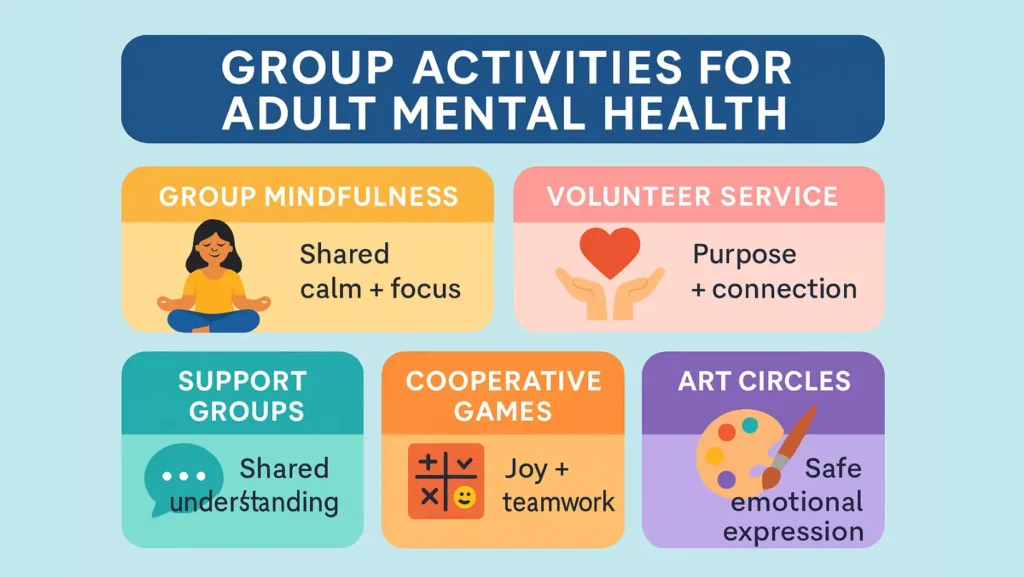Mental health activities for adults are daily actions that strengthen emotional balance, lower stress, and improve overall well-being. These activities include simple exercises, calming games, and self-care habits that help the mind recover from overload and stay resilient.
When adults practice them regularly, they think more clearly, sleep better, and connect with others more easily. Maintaining mental health is an essential part of healthy adult life.
Table of Contents
ToggleWhy Mental Health Activities Matter for Adults
You need reliable ways to care for your mind. Regular mental health activities for adults give you tools to manage stress, sleep better, and think clearly. These simple steps help lower daily tension. They help you keep calm when problems pile up. When you use them often, they change how you react to stress. You feel more present. You stay steady with family and work.
The Importance Of Emotional Wellness In Adult Life
Emotional wellness means you can notice feelings and act in a helpful way. You do not ignore emotions. You name them. Then you choose what to do. Use short tools that help you name a feeling and move on.
For example, you can take three steady breaths when anger rises. You can jot one line in a notebook when worry grows. These small moves protect long-term health.
How Mental Health Affects Productivity And Relationships
When your mind feels crowded, you miss details. You snap more. You avoid friends and family. mental health activities for adults break that loop. A five-minute breathing session can cut reactivity. A short walk can restart focus. When you feel calmer, you listen better. Work gets done faster. You make fewer mistakes. People around you feel safer and more relaxed.
The Science Behind Regular Mental Wellness Practices
Practices like breathing, brief movement, and journaling change brain wiring slowly. They help circuits that handle attention and emotion control. That makes it easier to calm down.
These effects show up in studies that track heart rate and focus. You do not need long sessions to get benefits. Short daily actions add up. That is why you should pick a few simple ones and keep doing them.
Adult Mental Health Exercises You Can Do Daily
You can add short habits to any day. These exercises fit busy schedules. Try one or two for a week. Track how you feel.
Mindfulness And Meditation Techniques
Sit quietly for three to ten minutes. Focus on your breath. If your mind wanders, bring it back without blame. Try counting your breaths up to five and back to one. Do this twice a day. Mindfulness trains attention. It also helps you notice feelings before they control your actions. Practice builds a steady response to stress.
Deep Breathing And Grounding Exercises
Use breathing to calm panic. Breathe in for four counts. Hold for two counts. Breathe out for six counts. Repeat five times. For grounding, name five things you see, four things you can touch, three things you hear, two things you smell, and one thing you taste. These moves anchor you to the present.
Yoga, Stretching, And Body Awareness Routines
A short stretch set by your desk lowers tension. Try neck rolls, shoulder lifts, and chest opens. Stand and reach, then fold slowly. Gentle yoga teaches you to link breath with motion. That lowers stress hormones. You do not need to be flexible to get a benefit.
Journaling For Self-Reflection And Stress Release
Write for five minutes without judging. Put a timer on. Let thoughts spill onto the page. This makes worry feel smaller. You can also write three quick things that stressed you and one action you will try tomorrow. Small notes help you see patterns over weeks.
Gratitude Journaling And Positive Affirmations
Each night, name three things that went well. Keep entries short. Say one short, true sentence to yourself each morning, like: “I can do the next step.” These moves train your mind to look for small wins. They raise the mood over time.
Self-Care Activities For Adult Mental Health
Self-care is simple. It does not need to be expensive. It needs to be regular.
Creating A Daily Relaxation Ritual
Pick a short practice you like: hot tea, sitting by a window, or five minutes of slow music. Do it at the same time each day. Rituals give your nervous system a predictable break.
Disconnecting From Digital Overload
Turn off notifications for one hour. Put the phone away during meals. Set a screen-free time before bed. Reducing digital noise lowers stress and improves sleep.
Spending Time Outdoors And Practicing Nature Therapy
Ten minutes outside can lift your mood. Walk slowly. Notice leaves, air, and light. Nature calms the body and clears your head. You do not need long hikes to see change.
Using Music And Art For Emotional Release
Choose tunes that match how you feel. Sing along. Move to a song. Draw with no plan. Art and music let you express things that are hard to say. They ease strong feelings.
Building Healthy Sleep And Nutrition Habits
Go to bed at a steady hour. Avoid heavy meals before sleep. Eat simple, balanced meals. Good sleep and steady food help your brain manage stress. Small habits matter more than rare big changes.
Mental Health Games For Adults
Games are tools that teach skills. You can use them alone or with others.
Icebreaker Games For Group Therapy Or Workshops
Use simple prompts like “Name one small win today.” Keep turns short. These quick games help people open up and build trust.
Mental Fitness Puzzles And Memory Games
Play memory match, word puzzles, or pattern games. They train attention and problem-solving. Short practice helps your mind stay sharp.
Mindful Coloring And Creative Drawing Challenges
Color or draw with attention. Use simple shapes. Focus on how the marker feels. This slows your brain and eases worry.
Gratitude Jar Or Positivity Challenge
Write one good thing each day on a slip of paper. Place it in a jar. Read them at the end of the month. This builds positive focus. This is one of the useful mental health self-care activities for adults you can try.
Team-Based Wellness Games For Offices Or Communities
Organize a simple step challenge or a daily check-in game. Team games bring lightness. They build small wins and social support. These qualify as adult mental health group activities for work and community groups.
Group Activities For Adult Mental Health
Group work gives structure and social support. Try options that keep people safe and respected.
Group Mindfulness And Guided Meditation Sessions
Meet for a short guided practice. Use a leader or a recorded guide. Group practice keeps people accountable. It also makes the habit easier to keep.
Volunteer Or Community Service Programs
Helping others gives you purpose and calm. Try a local effort that fits your time. Even a few hours a month helps.
Mental Health Support Group Discussions
Use clear rules for sharing. Keep groups small. Guided sharing helps people learn from each other. This reduces shame.
Cooperative Board Games For Connection And Joy
Choose games that require collaboration. Shared wins create laughter. Laughter lowers stress fast.
Art Therapy Circles And Storytelling Exercises
In a group, share a short memory. Then make a small drawing about it. This helps people express emotion without pressure. These sessions build trust and creativity.
Stress Relief Activities For Adults
Use these when you feel pressure. They are quick and effective.
Progressive Muscle Relaxation (PMR)
Tense a muscle group for five seconds, then release for ten seconds. Move from feet to head. PMR reduces body tension quickly and helps you sleep.
Breathing Patterns For Anxiety And Calmness
Practice box breathing with four counts in, four hold, four out, four hold. Repeat a few cycles. This stabilizes heart rate and calms your mind.
Creative Expression For Emotional Regulation
Write a short list of feelings. Paint with a brush or finger. Expressing feelings moves them out of your head.
Quick Mindfulness Breaks During Stressful Days
Use one-minute checks. Notice breath. Place a hand on your heart. Count three slow breaths. These breaks interrupt stress and let you return to tasks.
Movement-Based Relaxation (Dance, Walking Meditation)
Dance to one song with no plan. Walk slowly and feel each step. Movement helps you release energy and shift mood. Try this whenever you notice tension.
Workplace Mental Health Activities For Adults
Small workplace habits make big changes for teams.
Team-Building Exercises For Emotional Resilience
Start meetings with a one-sentence check-in. Ask each person a short question. These build empathy and help teams spot when someone needs support.
Desk Yoga And Short Mindfulness Breaks
Offer two-minute stretch breaks. Lead simple neck and shoulder moves. Short breaks increase focus and reduce pain.
Office Gratitude Wall Or Reflection Journals
Create a board or journal for short positive notes. Encourage everyone to add one line per week. This builds a kinder culture.
Mental Health Awareness Events At Work
Host short practical sessions. Teach breathing and quick tools. Offer printed one-page guides that employees can use at their desk.
Employee Wellness Challenges And Campaigns
Run a friendly month-long challenge for steps or sleep. Keep the tone light. Celebrate small progress. This increases connection and healthy habit building.
Virtual And Online Mental Health Activities
Digital tools help when you cannot meet in person.
Guided Meditations Via Apps Or Podcasts
Use short guided tracks for five to ten minutes. Consistency matters more than length. Try one quick session daily.
Virtual Therapy And Support Groups
Online therapy and groups offer convenience. Choose licensed professionals when possible. Groups help you learn skills and get peer support.
Online Journaling Communities
Join prompt groups that share ideas. They keep you writing and reflecting with quiet support.
Digital Detox And Mindful Technology Use
Schedule phone-free times. Remove apps that trigger stress. Track screen time and reduce it slowly.
Virtual Workshops For Self-Improvement
Attend short live sessions on sleep, focus, or stress. Practice at home immediately after the session to reinforce new skills.
Incorporating Mindfulness Into Everyday Life
You can add mindful moments to daily tasks. Small steps help a lot.
Morning Mindfulness Routines
Spend one to three minutes breathing before you get out of bed. Choose a calm intention for the day. Small starts shape the rest of the day.
Practicing Gratitude Before Bed
Name three simple things that went well. Keep entries short. This shifts your focus to positives and helps you sleep.
Mindful Eating And Daily Reflection Habits
Eat without screens. Notice taste and texture. Chew slowly. This reduces impulsive eating and increases calm.
Breathing Awareness During Commutes
Count your breath while commuting. This lowers stress before work or after a long day.
Benefits Of Group-Based Mental Health Activities
Group activities give social lift and practical learning.
Social Connection And Emotional Safety
Groups reduce loneliness. You feel less alone when others share similar challenges. That feeling of safety helps you heal.
Learning Through Shared Experiences
You learn tools faster when others show what works. Groups let you try simple moves with support.
Reducing Isolation And Stigma
Talking about mental health makes it normal. That helps people ask for help when they need it.
Building Supportive Environments At Work And Home
When homes and workplaces share simple tools, support becomes a habit. That keeps you steady in hard times.
How To Choose The Right Activity For You
Match tools to your goals and time. Test gently.
Identify Your Mental Health Goals
Do you want less anxiety, more focus, or better sleep? Pick one goal. Choose a tool that targets that goal.
Choose Between Solo Or Group-Based Options
If you want privacy, pick journaling and solo exercises. If you want connection, join a short group or a class. Both paths work.
Adapt Activities For Your Schedule And Comfort Level
Start with five minutes. Add minutes slowly. Do not force long sessions. Small habits build stronger results.
Track Progress Through Reflection And Journaling
Write one short line each week about change. Note energy, sleep, and focus. Small notes show steady progress.
FAQs
What are examples of self-care activities for mental health?
Mental health activities for adults include walking, short breathing exercises, journaling, mindful eating, sleep routine, music therapy, and simple yoga. These self-care steps fit daily life and boost mood fast.
How do mental health games help adults?
Mental health games for adults improve focus, memory, and social skills. They lower stress, build small wins, and teach coping. Play puzzles, group challenges, or mindful coloring to feel calmer.
What are effective group therapy activities?
Effective adult mental health group activities include guided meditation, shared journaling, role play, storytelling, and cooperative tasks. These foster trust, reduce shame, and help members learn practical coping tools together.
Can stress relief exercises improve mental focus?
Short stress relief activities for adult mental health, such as box breathing, brief walks, or progressive muscle relaxation, clear the mind. Regular practice reduces anxiety and improves attention quickly daily.
How do I build a mental wellness routine?
Start with one short habit. Use mental health activities for adults like five-minute breathing, a brief walk, or two-minute journaling. Track progress and add one habit every two weeks consistently daily.
What are low-cost activities for adult mental health?
Low-cost options include walking, journaling, breath work, free online meditations, community groups, and mindful coloring. These mental health activities for adults require little money and give big mood benefits every day.
How can workplaces support employee mental wellness?
Offer brief breaks, short workshops, a gratitude wall, and light wellness challenges. Use mental health activities for adults that fit the schedule. Keep support simple, regular, and respectful of privacy.
About The Author

Medically reviewed by Dr. Chandril Chugh, MD, DM (Neurology)
Dr. Chandril Chugh is a U.S.-trained, board-certified neurologist with expertise in diagnosing and managing neurological disorders, including migraines, epilepsy, Parkinson’s disease, and movement disorders. His clinical focus includes evidence-based neurological care and patient education.
All content is reviewed for medical accuracy and aligned with current neurological guidelines.






